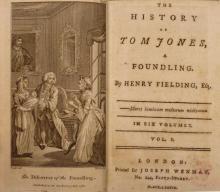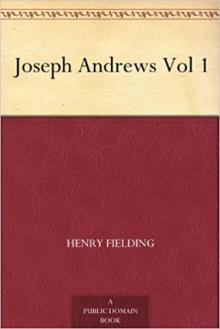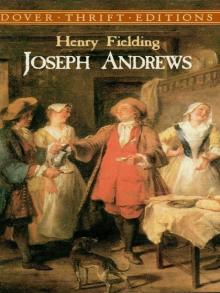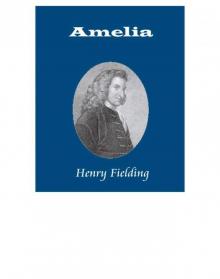- Home
- Henry Fielding
Complete Fictional Works of Henry Fielding
Complete Fictional Works of Henry Fielding Read online
The Complete Works of
HENRY FIELDING
(1707-1754)
Contents
The Novels
AN APOLOGY FOR THE LIFE OF MRS SHAMELA ANDREWS
THE HISTORY OF THE ADVENTURES OF JOSEPH ANDREWS
THE LIFE OF MR JONATHAN WILD THE GREAT
THE HISTORY OF TOM JONES, A FOUNDLING
THE HISTORY OF AMELIA
The Plays
LOVE IN SEVERAL MASQUES
THE TEMPLE BEAU
THE AUTHOR’S FARCE; AND THE PLEASURES OF THE TOWN
TOM THUMB: A TRAGEDY
RAPE UPON RAPE
THE LETTER-WRITERS
THE GRUB STREET OPERA
THE LOTTERY
THE MODERN HUSBAND
THE COVENT-GARDEN TRAGEDY
THE OLD DEBAUCHEES
THE MOCK DOCTOR
THE MISER
THE INTRIGUING CHAMBERMAID
DON QUIXOTE IN ENGLAND
AN OLD MAN TAUGHT WISDOM
THE UNIVERSAL GALLANT
PASQUIN, A DRAMATICK SATIRE ON THE TIMES
TUMBLE-DOWN DICK
EURYDICE, A FARCE
THE HISTORICAL REGISTER FOR THE YEAR 1736
EURYDICE HISS’D
MISS LUCY IN TOWN
PLUTUS, THE GOD OF RICHES
THE WEDDING-DAY
THE FATHERS, OR THE GOOD-NATUR’D MAN
The Poems
LIST OF POEMS IN CHRONOLOGICAL ORDER
LIST OF POEMS IN ALPHABETICAL ORDER
The Non-Fiction
THE JOURNAL OF A VOYAGE TO LISBON
A JOURNEY FROM THIS WORLD TO THE NEXT
AN ESSAY ON CONVERSATION
AN ESSAY ON THE KNOWLEDGE OF THE CHARACTERS OF MEN
AN ESSAY ON NOTHING
THE OPPOSITION: A VISION
THE TRUE PATRIOT
A SELECTION FROM THE COVENT-GARDEN JOURNAL
THE FEMALE HUSBAND
FAMILIAR LETTERS
The Biographies
THE LIFE OF HENRY FIELDING by Sir Walter Scott
FIELDING by Austin Dobson
© Delphi Classics 2013
Version 1
The Complete Works of
HENRY FIELDING
By Delphi Classics, 2013
Interested in Eighteenth Century literature?
Then you’ll love these eBooks…
For the first time in publishing history, Delphi Classics is proud to present the complete works of these writers, with beautiful illustrations and the usual bonus material.
www.delphiclassics.com
The Novel s
Henry Fielding was born in 1707 at Sharpham Park, near Glastonbury, in Somerset. The son of an army lieutenant and a judge’s daughter, he was born into wealthy and secure family.
Sharpham House, the author’s birthplace
The countryside surrounding the park, which would have been familiar to the young Henry
AN APOLOGY FOR THE LIFE OF MRS SHAMELA ANDREW S
Henry Fielding’s first novel was published in April 1741 under the name of Mr. Conny Keyber and sold for one shilling and sixpence. Although the author never owned to writing the short satirical novel, it is widely considered to be his work. An Apology for the Life of Mrs Shamela Andrews is a direct attack on the contemporary novel Pamela, published in November 1740, by Fielding’s rival Samuel Richardson. The epistolary tale of a resolute servant girl, armed only with her ‘virtue’ to battle against her master’s attempts at seduction, had become an overnight literary sensation in 1741.
Also composed in the epistolary format, Fielding’s novel claims to offer a shocking view of the true events that took place in the life of Pamela Andrews, the main heroine of Richardson’s novel. From Fielding we learn that, instead of being a kind and chaste servant-girl, Pamela (whose true name turns out to be Shamela, punning on ‘Shame’ and ‘Sham’) is in fact a wicked and lascivious creature, scheming to entrap her master, Squire Booby, into marriage. The novel offers a sustained parody of the stylistic failings and moral hypocrisy that Fielding saw in Richardson’s work. Therefore, Fielding’s’ novel is tantamount to a re-reading of Pamela from a corrupted and alternative viewpoint.
The original title page
CONTENTS
TO MISS FANNY, &C.
LETTERS TO THE EDITOR.
THE EDITOR TO HIMSELF.
JOHN PUFF, ESQ; TO THE EDITOR.
PARSON TICKLETEXT TO PARSON OLIVER.
PARSON OLIVER TO PARSON TICKLETEXT.
LETTER I. SHAMELA ANDREWS TO MRS. HENRIETTA MARIA HONORA ANDREWS AT HER LODGINGS AT THE FAN AND PEPPER-BOX IN DRURY-LANE.
LETTER II. SHAMELA ANDREWS TO HENRIETTA MARIA HONORA ANDREWS.
LETTER III. HENRIETTA MARIA HONORA ANDREWS TO SHAMELA ANDREWS.
LETTER IV. SHAMELA ANDREWS TO HENRIETTA MARIA HONORA ANDREWS.
LETTER V. HENRIETTA MARIA HONORA ANDREWS TO SHAMELA ANDREWS.
LETTER VI. SHAMELA ANDREWS TO HENRIETTA MARIA HONORA ANDREWS.
THURSDAY NIGHT, TWELVE O’CLOCK.
FRIDAY MORNING.
LETTER VII. MRS. LUCRETIA JERVIS TO HENRIETTA MARIA HONORA ANDREWS.
LETTER VIII. HENRIETTA MARIA HONORA ANDREWS TO LUCRETIA JERVIS.
LETTER IX. SHAMELA ANDREWS TO HENRIETTA MARIA HONORA ANDREWS.
PARSON WILLIAMS TO PAMELA ANDREWS.
LETTER X. SHAMELA ANDREWS TO HENRIETTA MARIA HONORA ANDREWS.
SQUIRE BOOBY TO PAMELA.
LETTER XI. HENRIETTA MARIA HONORA ANDREWS TO SHAMELA ANDREWS.
LETTER XII. SHAMELA ANDREWS TO HENRIETTA MARIA HONORA ANDREWS.
PARSON WILLIAMS TO PAMELA.
PARSON WILLIAMS TO SQUIRE BOOBY.
SHAMELA BOOBY TO HENRIETTA MARIA HONORA ANDREWS.
PARSON TICKLETEXT TO PARSON OLIVER.
Fielding’s rival, Samuel Richardson (1689–1761), is best known for his three epistolary novels: Pamela: Or, Virtue Rewarded (1740), Clarissa: Or the History of a Young Lady (1748) and The History of Sir Charles Grandison (1753). Richardson was an established printer and publisher for most of his life and printed almost 500 different works, including various journals and magazines.
AN
APOLOGY
FOR THE
LIFE
OF
Mrs. Shamela Andrews.
In which, the many notorious Falshoods and Misreprsentations of a Book called
PAMELA,
Are exposed and refuted; and all the matchless Arts of that young Politician, set in a true and just Light.
Together with
A full Account of all that passed between her and Parson Arthur Williams; whose Character is represented in a manner something different from that which he bears in PAMELA. The whole being exact Copies of authentick Papers delivered to the Editor.
Necessary to be had in all Families.
By Mr. CONNY KEYBER.
LONDON:
Printed for A. Dodd, at the Peacock, without Temple-bar.
M. DCC. XLI.
To Miss Fanny, &c.
Madam,
It will be naturally expected, that when I write the Life of Shamela, I should dedicate it to some young Lady, whose Wit and Beauty might be the proper Subject of a Comparison with the Heroine of my Piece. This, those, who see I have done it in prefixing your Name to my Work, will much more confirmedly expect me to do; and, indeed, your Character would enable me to run some Length into a Parallel, tho’ you, nor any one else, are at all like the matchless Shamela.
You see, Madam, I have some Value for your Good-nature, when in a Dedication, which is properly a Panegyrick, I speak against, not for you; but I remember it is a
Life which I am presenting you, and why should I expose my Veracity to any Hazard in the Front of the Work, considering what I have done in the Body. Indeed, I wish it was possible to write a Dedication, and get any thing by it, without one Word of Flattery; but since it is not, come on, and I hope to shew my Delicacy at least in the Compliments I intend to pay you.
First, then, Madam, I must tell the World, that you have tickled up and brightned many Strokes in this Work by your Pencil.
Secondly, You have intimately conversed with me, one of the greatest Wits and Scholars of my Age.
Thirdly, You keep very good Hours, and frequently spend an useful Day before others begin to enjoy it. This I will take my Oath on; for I am admitted to your Presence in a Morning before other People’s Servants are up; when I have constantly found you reading in good Books; and if ever I have drawn you upon me, I have always felt you very heavy.
Fourthly, You have a Virtue which enables you to rise early and study hard, and that is, forbearing to over-eat yourself, and this in spite of all the luscious Temptations of Puddings and Custards, exciting the Brute (as Dr. Woodward calls it) to rebel. This is a Virtue which I can greatly admire, though I much question whether I could imitate it.
Fifthly, A Circumstance greatly to your Honour, that by means of your extraordinary Merit and Beauty; you was carried into the Ball-Room at the Bath, by the discerning Mr. Nash; before the Age that other young Ladies generally arrived at that Honour, and while your Mamma herself existed in her perfect Bloom. Here you was observed in Dancing to balance your Body exactly, and to weigh every Motion with the exact and equal Measure of Time and Tune; and though you sometimes made a false Step, by leaning too much to one Side; yet every body said you would one time or other, dance perfectly well, and uprightly.
Sixthly, I cannot forbear mentioning those pretty little Sonnets, and sprightly Compositions, which though they came from you with so much Ease, might be mentioned to the Praise of a great or grave Character.
And now, Madam, I have done with you; it only remains to pay my Acknowledgments to an Author, whose Stile I have exactly followed in this Life, it being the properest for Biography. The Reader, I believe, easily guesses, I mean Euclid’s Elements; it was Euclid who taught me to write. It is you, Madam, who pay me for Writing. Therefore I am to both,
A most Obedient, and
obliged humble Servant,
Conny Keyber.
LETTERS TO THE EDITOR.
The Editor to Himself.
Dear SIR,
However you came by the excellent Shamela, out with it, without Fear or Favour, Dedication and all; believe me, it will go through many Editions, be translated into all Languages, read in all Nations and Ages, and to say a bold Word, it will do more good than the C —— y have done harm in the World,
I am, Sir,
Sincerely your Well-wisher,
Yourself.
John Puff, Esq; to the Editor.
SIR,
I have read your Shamela through and through, and a most inimitable Performance it is. Who is he, what is he that could write so excellent a Book? he must be doubtless most agreeable to the Age, and to his Honour himself; for he is able to draw every thing to Perfection but Virtue. Whoever the Author be, he hath one of the worst and most fashionable Hearts in the World, and I would recommend to him, in his next Performance, to undertake the Life of his Honour. For he who drew the Character of Parson Williams, is equal to the Task; nay he seems to have little more to do than to pull off the Parson’s Gown, and that which makes him so agreeable to Shamela, and the Cap will fit.
I am, Sir,
Your humble Servant,
John Puff.
Note, Reader, several other commendatory Letters and Copies of Verses will be prepared against the next Edition.
AN APOLOGY FOR THE LIFE OF MRS. SHAMELA ANDREWS.
Parson Tickletext to Parson Oliver.
Rev. SIR,
Herewith I transmit you a Copy of sweet, dear, pretty Pamela, a little Book which this Winter hath produced, of which, I make no doubt, you have already heard mention from some of your Neighbouring Clergy; for we have made it our common Business here, not only to cry it up, but to preach it up likewise: The Pulpit, as well as the Coffee-house, hath resounded with its Praise, and it is expected shortly, that his L — p will recommend it in a —— Letter to our whole Body.
And this Example, I am confident, will be imitated by all our Cloth in the Country: For besides speaking well of a Brother, in the Character of the Reverend Mr. Williams, the useful and truly religious Doctrine of Grace is every where inculcated.
This Book is the “Soul of Religion, Good-Breeding, Discretion, Good-Nature, Wit, Fancy, Fine Thought, and Morality. There is an Ease, a natural Air, a dignified Simplicity, and Measured Fullness in it, that resembling Life, out-glows it. The Author hath reconciled the pleasing to the proper; the Thought is every where exactly cloathed by the Expression; and becomes its Dress as roundly and as close as Pamela her Country Habit; or as she doth her no Habit, when modest Beauty seeks to hide itself, by casting off the Pride of Ornament, and displays itself without any Covering;” which it frequently doth in this admirable Work, and presents Images to the Reader, which the coldest Zealot cannot read without Emotion.
For my own Part (and, I believe, I may say the same of all the Clergy of my Acquaintance) “I have done nothing but read it to others, and hear others again read it to me, ever since it came into my Hands; and I find I am like to do nothing else, for I know not how long yet to come: because if I lay the Book down it comes after me. When it has dwelt all Day long upon the Ear, it takes Possession all Night of the Fancy. It hath Witchcraft in every Page of it. —— Oh! I feel an Emotion even while I am relating this: Methinks I see Pamela at this Instant, with all the Pride of Ornament cast off.
“Little Book, charming Pamela, get thee gone; face the World, in which thou wilt find nothing like thyself.” Happy would it be for Mankind, if all other Books were burnt, that we might do nothing but read thee all Day, and dream of thee all Night. Thou alone art sufficient to teach us as much Morality as we want. Dost thou not teach us to pray, to sing Psalms, and to honour the Clergy? Are not these the whole Duty of Man? Forgive me, O Author of Pamela, mentioning the Name of a Book so unequal to thine: But, now I think of it, who is the Author, where is he, what is he, that hath hitherto been able to hide such an encircling, all-mastering Spirit, “he possesses every Quality that Art could have charm’d by: yet hath lent it to and concealed it in Nature. The Comprehensiveness of his Imagination must be truly prodigious! It has stretched out this diminutive mere Grain of Mustard-seed (a poor Girl’s little, &c.) into a Resemblance of that Heaven, which the best of good Books has compared it to.”
To be short, this Book will live to the Age of the Patriarchs, and like them will carry on the good Work many hundreds of Years hence, among our Posterity, who will not HESITATE their Esteem with Restraint. If the Romans granted Exemptions to Men who begat a few Children for the Republick, what Distinction (if Policy and we should ever be reconciled) should we find to reward this Father of Millions, which are to owe Formation to the future Effect of his Influence. —— I feel another Emotion.
As soon as you have read this yourself five or six Times over (which may possibly happen within a Week) I desire you would give it to my little God-Daughter, as a Present from me. This being the only Education we intend henceforth to give our Daughters. And pray let your Servant-Maids read it over, or read it to them. Both your self and the neighbouring Clergy, will supply yourselves for the Pulpit from the Book-sellers, as soon as the fourth Edition is published. I am,
Sir,
Your most humble Servant,
Tho. Tickletext.
Parson Oliver to Parson Tickletext.
Rev. SIR,
I Received the Favour of yours with the inclosed Book, and really must own myself sorry, to see the Report I have heard of an epidemical Phrenzy now raging in Town, confirmed in the Person
of my Friend.
If I had not known your Hand, I should, from the Sentiments and Stile of the Letter, have imagined it to have come from the Author of the famous Apology, which was sent me last Summer; and on my reading the remarkable Paragraph of measured Fulness, that resembling Life out-glows it, to a young Baronet, he cry’d out, C —— ly C —— b — r by G —— . But I have since observed, that this, as well as many other Expressions in your Letter, was borrowed from those remarkable Epistles, which the Author, or the Editor hath prefix’d to the second Edition which you send me of his Book.
Is it possible that you or any of your Function can be in earnest, or think the Cause of Religion, or Morality, can want such slender Support? God forbid they should. As for Honour to the Clergy, I am sorry to see them so solicitous about it; for if worldly Honour be meant, it is what their Predecessors in the pure and primitive Age, never had or sought. Indeed the secure Satisfaction of a good Conscience, the Approbation of the Wise and Good, (which, never were or will be the Generality of Mankind) and the extatick Pleasure of contemplating, that their Ways are acceptable to the Great Creator of the Universe, will always attend those, who really deserve these Blessings: But for worldly Honours, they are often the Purchase of Force and Fraud, we sometimes see them in an eminent Degree possessed by Men, who are notorious for Luxury, Pride, Cruelty, Treachery, and the most abandoned Prostitution; Wretches who are ready to invent and maintain Schemes repugnant to the Interest, the Liberty, and the Happiness of Mankind, not to supply their Necessities, or even Conveniencies, but to pamper their Avarice and Ambition. And if this be the Road to worldly Honours, God forbid the Clergy should be even suspected of walking in it.

 Joseph Andrews, Vol. 2
Joseph Andrews, Vol. 2 History of Tom Jones, a Foundling
History of Tom Jones, a Foundling Joseph Andrews, Vol. 1
Joseph Andrews, Vol. 1 Complete Fictional Works of Henry Fielding
Complete Fictional Works of Henry Fielding The History of Tom Jones (Penguin Classics)
The History of Tom Jones (Penguin Classics) Joseph Andrews
Joseph Andrews Amelia
Amelia